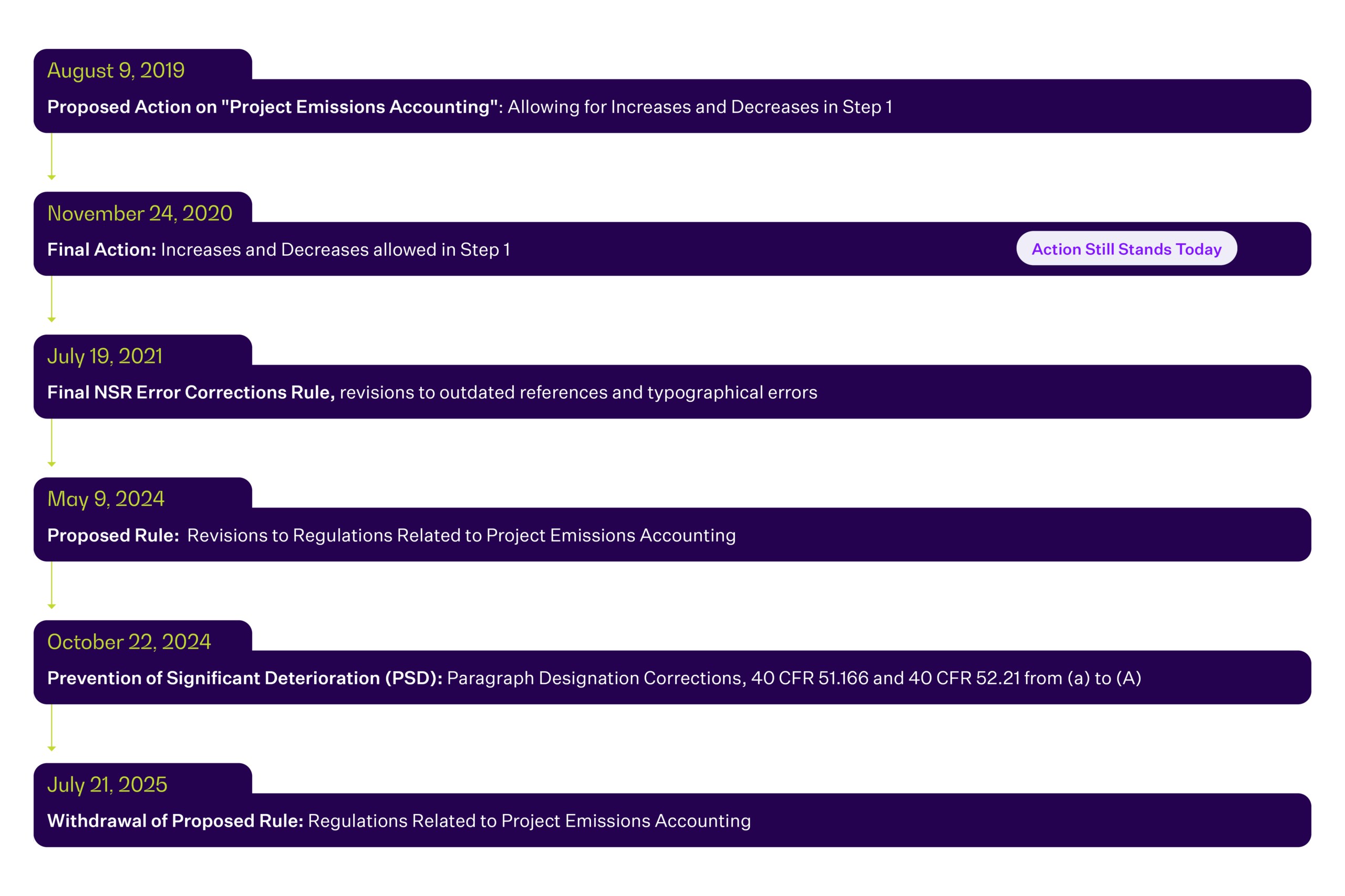Effective July 21, 2025, the United States Environmental Protection Agency (EPA) has officially withdrawn its proposed rule ‘‘Prevention of Significant Deterioration (PSD) and Nonattainment New Source Review (NNSR): Regulations Related to Project Emissions Accounting,’’ originally published in the Federal Register on May 3, 2024. The proposed rule aimed to:
- Further clarify the definition of a “project” under NSR regulations;
- Increase monitoring, recordkeeping and reporting requirements associated with NSR applicability and;
- Require that emissions decreases (as demonstrated in NSR applicability determinations) be enforceable.
Upon review, EPA determined that these proposed changes would impose an unnecessary burden on stationary sources as well as local regulators without sufficiently justifiable corresponding benefits. EPA does not plan to take further action at this time on the project emissions accounting provisions in the NSR regulations.
Background
Under the Clean Air Act, the NSR program is a preconstruction permitting program that requires certain stationary sources of air pollution to obtain permits prior to beginning construction. It applies to both new construction and to modifications of existing sources, regardless of whether the source is in an area where the National Ambient Air Quality Standards (NAAQS) have been exceeded (nonattainment) or in an area where the NAAQS have not been exceeded (attainment). NSR permits for major sources that are in attainment areas are referred to as Prevention of Significant Deterioration (PSD) permits. NSR permits for major sources located in nonattainment areas are designated as Nonattainment NSR (NNSR) permits. To determine NSR applicability, EPA has created a two-step process: the project must result in both (1) a significant emissions increase from the project (‘‘Step 1’’, also referred to as Project Emissions Accounting); and (2) a significant net emissions increase at the stationary source, taking account of emission increases and emission decreases attributable to other projects within a specific time frame (‘‘Step 2’’ of the NSR applicability analysis).
Timeline – Where Are We Now?
There have been several actions from EPA over the last several years surrounding NSR:
However, when it comes to Project Emissions Accounting, the action from November 24, 2020 still stands today. The final rule, titled ‘‘Prevention of Significant Deterioration (PSD) and Nonattainment New Source Review (NNSR): Project Emissions Accounting,” clarified that both increases and decreases resulting from a project shall be accounted for under Step 1 of the NSR applicability process. The EPA determined that a full accounting of emissions changes resulting from a project is more consistent with the definition of ‘‘modification’’ at CAA section 111(a)(4) because it ensures that projects that result in an overall decrease in emissions or in a de minimis increase in emissions will not be subject to the major NSR program.
It is important to note that many state and local air agencies have delegated authority for NSR/NNSR and promulgate their own rules to implement these programs. State and local air agencies may adopt these changes at their discretion, but are not required to do so. As such, it is imperative to identify the applicable rule (e.g., Federal or State/Local NSR/NNSR) and determine if Project Emission Accounting is available in the jurisdiction of the project.
Related Services
Next Steps: TRC Can Help
TRC anticipates further NSR/NNSR reform efforts as part of EPA’s March 12, 2025, announcement outlining 31 deregulatory actions under the Power the Great American Comeback initiative.
Our trusted practitioners partner with clients to develop efficient air quality permitting and compliance strategies that align with business goals and ensure timely regulatory approvals. With deep regulatory knowledge and experience across diverse industries, we manage complex projects while saving clients time and resources. Our nationwide presence and strong relationships with state regulators provide a blend of local insight and national expertise.
Stay tuned for more information on this topic and contact us for support with your projects today.




